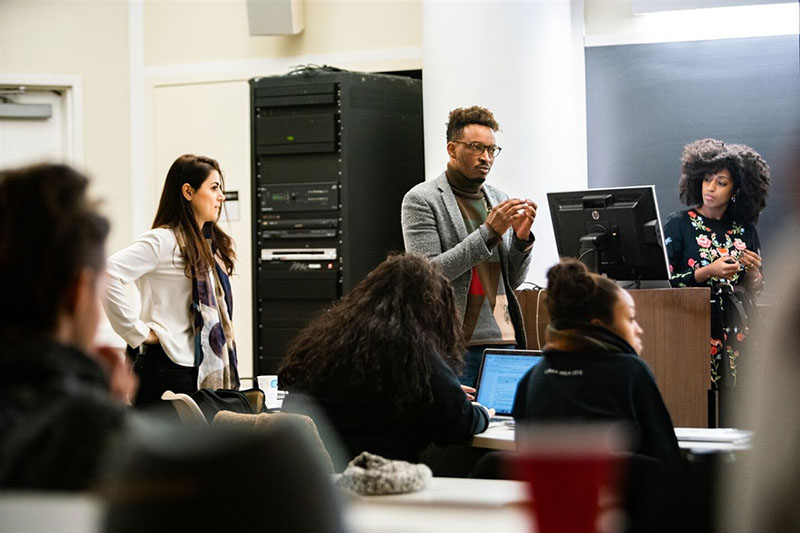
5 Things I’ve Learned From The Impact Entrepreneurship Initiative: Tips For Growing And Starting Your Venture by Clare Cannon
When I initially saw the link to apply for The New School Impact Entrepreneurship Initiative in the application for my MFA program, I had no idea what social entrepreneurship was. All I knew was that it involved business, provided a scholarship, and that I wanted in. I clicked on the button, watched the webinar, and sent in the required materials. When I was accepted a few months later, I eagerly packed my bags ready to move to New York. Yet once I arrived at The New School, I found that I had unwittingly boarded one of the most terrifying roller coasters I have ever encountered: entrepreneurship. Terrified, I decided to hold on, brace, and learn all I could to navigate the winding ride.
The New School taught me that social entrepreneurship is a tool for causing rippling and lasting change in the complex ecosystems where we humans live, work, and play. Social entrepreneurship uses business as a tool for creating social, environmental, and economic change. It is designing with people, not for people, in order to make a positive impact on society.
But what do we mean by impact?
Impact is defined as:
noun | ˈimˌpak(t) | the action of one object coming forcibly into contact with another: there was the sound of a third impact | bullets that expand and cause devastating injury on impact. • the effect or influence of one person, thing, or action, on another: our regional measures have had a significant impact on unemployment. verb | imˈpak(t), ˈimˌpak(t) | [no object] 1 come into forcible contact with another object: the shell impacted twenty yards away. • [with object] mainly North American come into forcible contact with: an asteroid impacted the earth some 60 million years ago. • [with object] press firmly: the animals’ feet do not impact and damage the soil as cows’ hooves do. 2 (impact on) have a strong effect on someone or something: high interest rates have impacted on retail spending | [with object] : the move is not expected to impact the company’s employees.
So impact means to have a strong effect or influence on others. For example, you can use existing structure to create change, become a founder, join a team, and attend talks and networking events. If you are interested in starting your own business venture, or joining the Impact Entrepreneurship Initiative at The New School, here are a few key takeaways that I’ve learned from my experiences on the ride.
1. Start Asking Questions
One of the key benefits of impact entrepreneurship is that it empowers individuals to make a difference. I will never forget when one of my Milano classes, introduced me to the concept of intersectionality. Before, I’d never really given much thought to how I could use business to create social mobility. By intentionally creating business that are aligned with your values and goals, you can use your skills and resources to address some of the most pressing challenges facing our society today. This not only create a sense of purpose and fulfillment for the entrepreneur, but it also generates real-world impact that can help to create a better future for us all.
2. Listen To Your Community
When I first came to Parsons, I thought that I wanted to help third-culture kids. In class, I was challenged to think about why, and realized that I had developed my whole business idea based on false assumptions. In class, it was stressed that you need to talk to the people that you want to help. Ask them what their needs are. When building your venture, start by asking people in the communities that you want to serve. Do surveys, ask questions, go out for coffee. What keeps the people you want to serve up at night? Those are the pain points. Design a product or MVP that addresses those needs. Don’t design for people. Design with people.
3. Build a Team
At The New School, I realized the importance of having a support team when building your venture. Make sure to surround yourself with mentors. Ask for help. Listen to podcasts. Go to events and networking opportunities. Start by developing your entrepreneurial mindset, which means learning to think creatively and critically about the issues you’re trying to address. Develop skills and knowledge by taking courses, or participating in community events, such as start up incubators and competitions. Connect with local startups and social enterprises in your community. By building these connections, you can learn from others who are already working in this space, find potential collaborators and partners, and get a better sense of the opportunities and challenges involved in entrepreneurship. They will help you prepare for, navigate, and hold on throughout the ride.
4. Pick One Core Issue
Remember. Rome wasn’t built in a day. Or New York for that matter. Start small. Dream big. Brainstorm. Aim for ripple effects. You don’t have to solve all the world’s problems with one project. Start with one MVP that can solve a problem using your unique expertise. We’re aiming to leave fingerprints on the world around us, and use a system of change to help create rippled effects of impact.
5. Prototype. Prototype. Prototype.
Test. Revise. Repeat. Test your ideas. Revise. Test again. Create an MVP. Test. Revise. Test again.